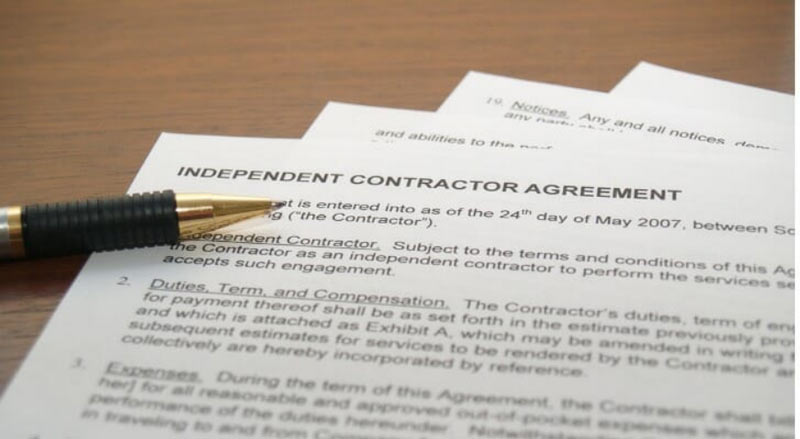Are you an independent contractor needing a better understanding of tax obligations? If so, then this guide is for you! This comprehensive guide takes an in-depth look at the complexities of independent contractor taxes. We'll discuss everything from filing requirements and deadlines, writing off expenses, and the various tax forms that may be needed, along with helpful advice on maximizing your deductions.
After reading this guide, you'll have the knowledge and confidence to handle your taxes like a pro—it's just one more way to put money back into your pocket.
Independent Contractor Taxes

Regarding taxes, independent contractors face unique challenges. As self-employed individuals, you're solely responsible for understanding and meeting your tax obligations. This means that you need to be on top of filing requirements, deadlines, and deductions available to you as an independent contractor.
The Internal Revenue Service (IRS) considers all income earned by independent contractors as taxable, so it's important to understand how much money needs to be set aside each year for taxes. Most importantly, don't forget about the self-employment tax a special type of tax that independent contractors must pay in addition to federal and state income taxes.
Fortunately, there are several deductions available to independent contractors. This includes expenses for running your business, such as office supplies, equipment, and travel costs. Knowing which deductions you can claim and how will help reduce your taxable income.
Who Qualifies as an Independent Contractor?

There are a few key differences between employees and independent contractors. Most importantly, an employee is hired to work for a specific employer on tasks that the employer assigns, while an independent contractor works independently on their projects at their discretion. The IRS considers any individual meeting these criteria to be an independent contractor:
• You're in business for yourself, which means you're responsible for your profit and loss.
• You possess the necessary skills or training required to do the job.
• You can set your hours.
• You don't receive benefits from the company you're working with.
• You set your rates and prices.
Filing Requirements and Deadlines as an Independent Contractor
As an independent contractor, it's important to understand your filing requirements and deadlines. For the most part, your tax obligations are fairly straightforward—you must file a 1040-ES form to report your estimated taxes on an annual basis, you must make quarterly payments if you owe more than $1,000 in taxes for the year, and you should also keep records of all income and expenses throughout the year.
The federal income tax filing date is April 15 of each year. However, if you work for yourself or as an independent contractor, you can benefit from more time by requesting an extension (Form 4868). You will have till October 15 to file your taxes as a result.
It's also crucial to comprehend any tax forms you might have to provide with your return.
Depending on your specific situation, you may need to complete Form 1099-MISC for freelance work or Form W-2 if you have employees working for you during the year. Additionally, consult with a qualified tax professional who can help ensure that all of your paperwork is in order and that you are taking advantage of every deduction available.
Different Types of Taxes you may Need to Pay as an Independent Contractor
As an independent contractor, there are several taxes that you may need to pay. The most common ones include:
Federal Income Tax
This is based on your total annual income and is calculated using the tax tables provided by the IRS.
Self-Employment Tax
This consists of Social Security and Medicare taxes and must be paid if your net earnings amount to at least $400 in a given year.
State Income Tax
Depending on where you live, you may also be required to pay state taxes on your income.
Local Taxes
Some cities or counties may impose local taxes, so check with your local government for further information.
Sales & Use Tax
This is required if you purchase items for your business or sell goods or services in certain states.
You may also be required to pay estimated taxes throughout the year, depending on how much money you expect to make. Please do so to avoid paying interest and penalties when tax time comes around.
How Is Independent Contractor Income Paid and Reported?
As an independent contractor, you'll receive payment in various forms. This includes cash, check, bank transfer, or credit card payments. The income you receive is reported to the IRS on Form 1099-MISC—a document that serves as proof of your earnings for tax purposes.
Your clients should issue this form to you at the end of the year, and it's also important to note that you may need to file multiple 1099-MISC forms if you worked with more than one client during the year. The information on this form will be used when calculating your estimated taxes and filing your return.
Tax Deductions for Independent Contractors
As an independent contractor, you're eligible to take advantage of several deductions that can help reduce your taxable income. This includes business expenses related to running your business, such as office supplies, equipment, and travel costs. Additionally, you can deduct certain home office expenses if you use a part of your home exclusively for your business.
It's also important to remember that you can only claim deductions for items that are directly related to your business. This means that any personal expenses cannot be claimed as deductions—so keep careful track of all receipts throughout the year so there's no confusion come tax time.
When it comes to filing taxes as an independent contractor, knowledge is power. Educating yourself on the filing requirements and taking advantage of deductions will help you save time and money when tax time comes around.
FAQS
What is the tax form for independent contractors in Canada?
In Canada, independent contractors must file their taxes using form T2125-Statement of Business or Professional Activities.
How often does an independent contractor have to pay taxes?
Most independent contractors are required to make estimated quarterly tax payments. In addition, they must file an annual tax return in April.
Are there any tax breaks for independent contractors?
Independent contractors are eligible for several tax deductions related to their business expenses. These include office supplies, equipment, travel, and home office expenses. It's important to keep accurate records of all expenses throughout the year to take full advantage of these deductions when filing your taxes.
Conclusion
The process of managing taxes as an independent contractor may seem overwhelming at first. However, if you break it down into smaller tasks, it becomes a much easier process. Remember, preparation is the key to success when handling taxes like an independent contractor. Understanding your tax responsibilities will give you a greater chance of staying on top of them and saving money in the long run. To help with this process, I recommend following our comprehensive Independent Contractor's Guide To Taxes. With this guide, you'll have all the tools to explore how your income as an independent contractor affects your taxes, whether local or federal government taxes.




